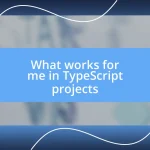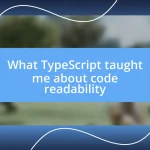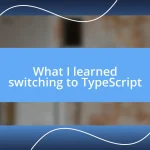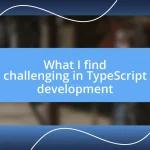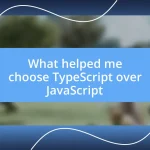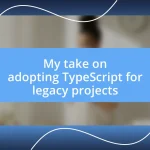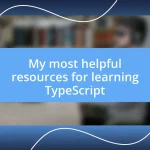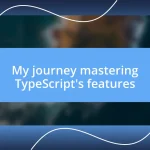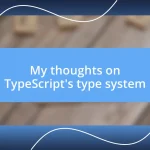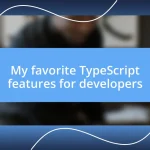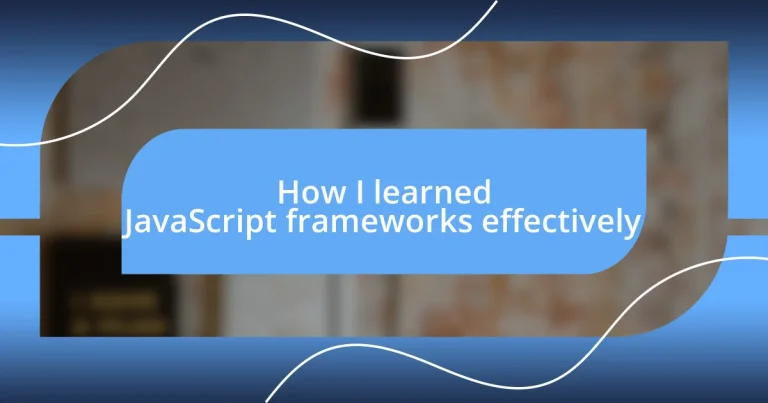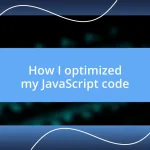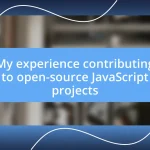Key takeaways:
- Understanding JavaScript frameworks like React, Vue, and Angular enhances development efficiency and fosters collaborative coding communities.
- Choosing the right framework involves evaluating project scope, learning curve, community support, performance, and scalability for informed decision-making.
- Active learning through practical projects, online communities, and regular code reflection massively enhances skill acquisition and retention in JavaScript frameworks.
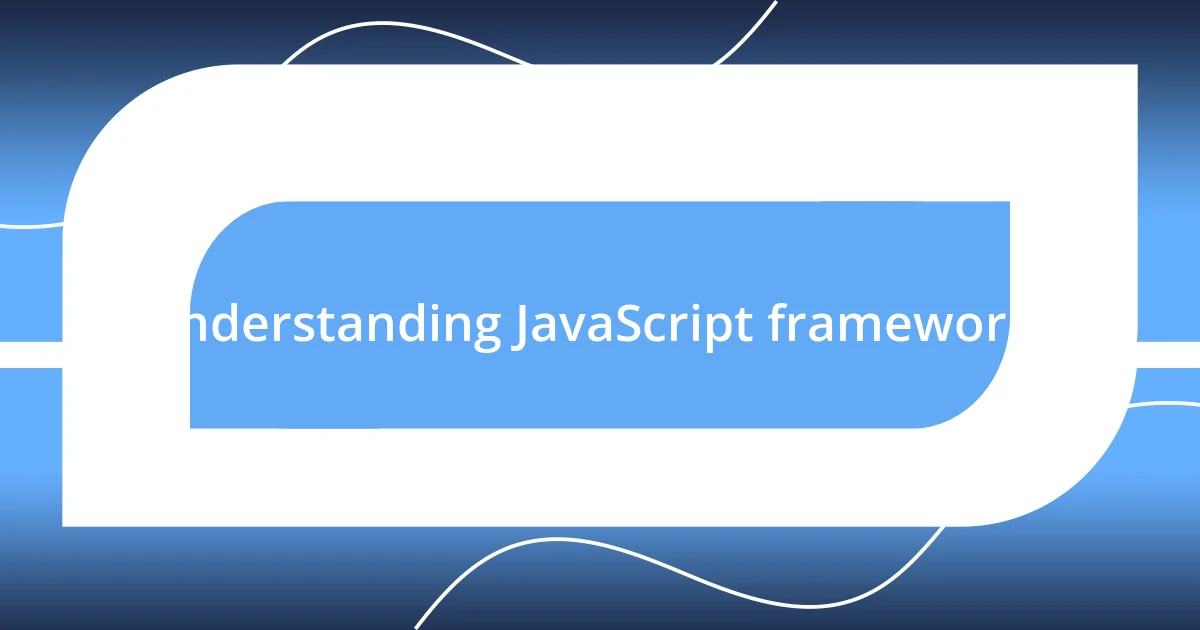
Understanding JavaScript frameworks
Understanding JavaScript frameworks can be a game changer in your web development journey. I remember the first time I stumbled into a framework—React to be specific. It felt like going from black-and-white television to full color. The abstraction it provided made coding so much more efficient and enjoyable. I often wonder, how did developers ever manage without these tools?
When I delved deeper into other frameworks like Vue and Angular, I realized each has its unique strengths and philosophy. For instance, Vue’s gentle learning curve is great for beginners, while Angular’s robustness appeals to enterprise-level applications. I found myself captivated by how frameworks not only streamline development but also shape coding communities. They cultivate a specific mindset in developers, fostering collaboration and shared problem-solving. Have you ever felt that sense of belonging when working within a framework’s ecosystem?
Beyond just speeding up development, understanding these frameworks deeply influences how I approach problem-solving. For example, the component-based architecture of frameworks encourages modular thinking. This was illuminating for me; I started viewing not just code but entire projects in smaller, more manageable pieces. It’s fascinating to see how frameworks can change not just what we build, but how we think about building. Wouldn’t you agree that a shift in perspective can lead to breakthroughs in our projects?
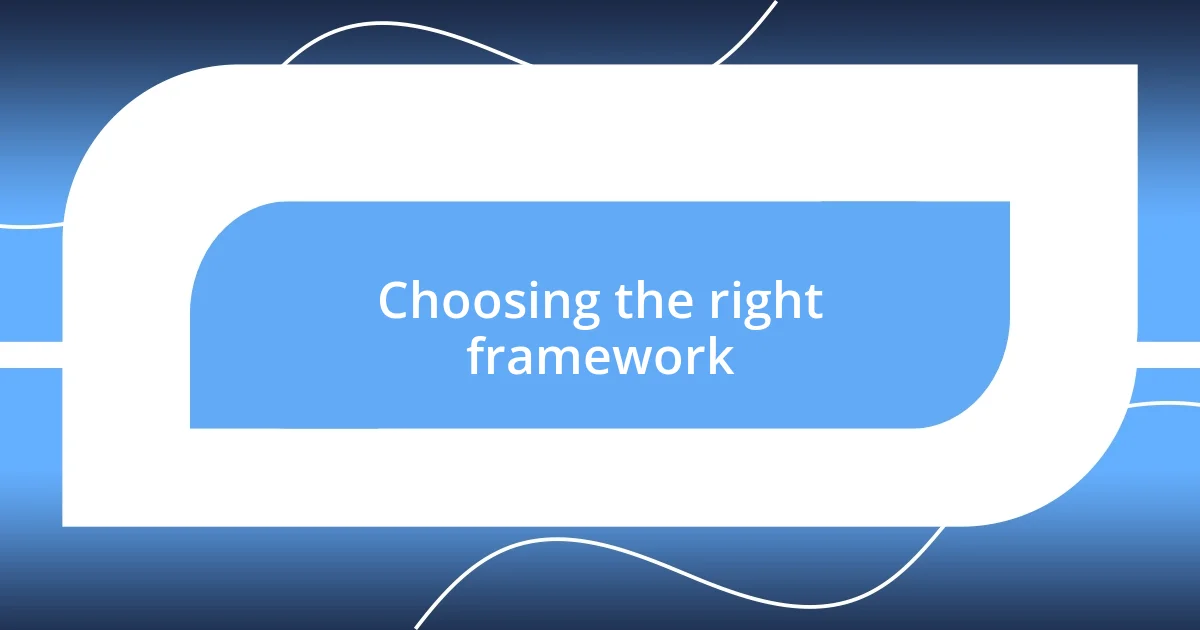
Choosing the right framework
Choosing the right JavaScript framework can be a daunting task, especially with so many options available. I remember spending a week just weighing the pros and cons of each one. In the end, I realized it’s not just about the framework’s features but also how well it aligns with my project’s requirements and my team’s skill set. You need to think about the long-term implications as well—who will maintain the code? What kind of support or community does the framework have? Asking these questions helped me make decisions that felt less like guessing and more like informed choices.
When considering a framework, here are some key factors to evaluate:
- Project Scope: Is it complex or simple? Some frameworks shine in different scenarios.
- Learning Curve: How quickly can you and your team adapt? The last thing you want is to get stuck in the learning phase.
- Community and Support: A strong community can make all the difference. Are there resources, forums, or documentation readily available?
- Performance: If speed is a priority, think about how each framework handles load and efficiency.
- Scalability: Will the framework support future growth if your project takes off?
Taking the time to choose the right framework is like laying a strong foundation for a house. I learned that the extra effort upfront pays off in a smoother development process down the road. It’s a decision that can help you avoid many headaches later.
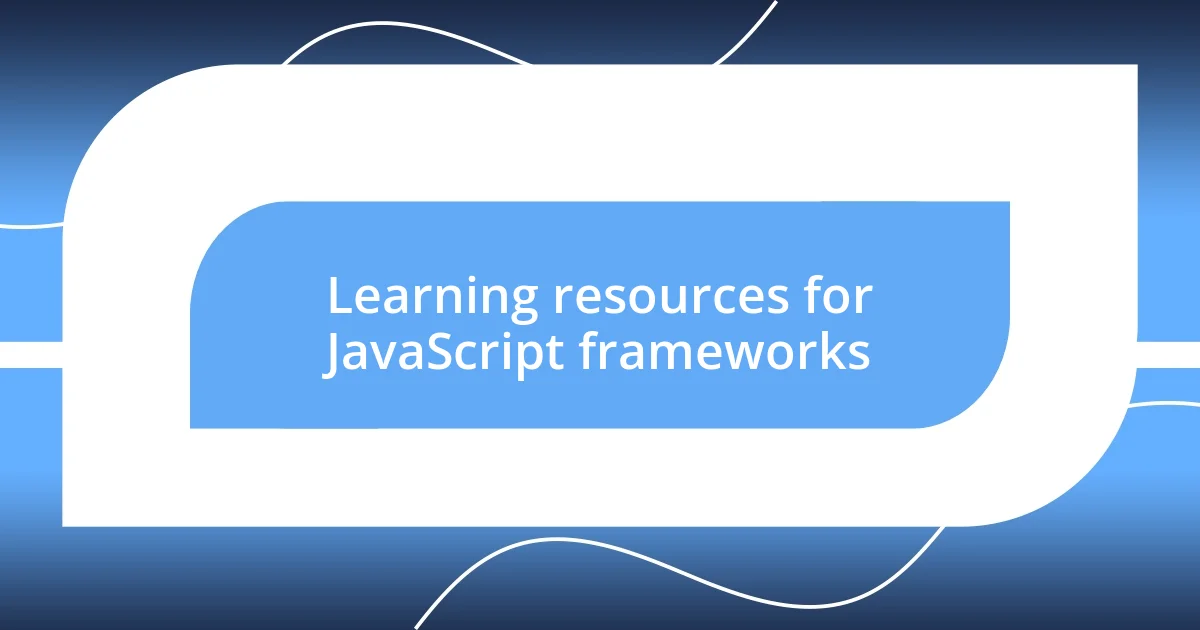
Learning resources for JavaScript frameworks
Learning JavaScript frameworks can be greatly supported by a variety of resources. Personally, I’ve found that online platforms like Udemy and Coursera offer fantastic structured courses that guide you step-by-step through each framework’s intricacies. Additionally, I often turn to YouTube tutorials for quick, practical demonstrations. The beauty of these visual resources is that you can see the code in action, making it easier to grasp concepts that might seem abstract in text-based materials. Have you ever paused a video mid-tutorial just to test out what you’ve learned? I know I have, and those moments are pivotal for solidifying my understanding.
Books can also be invaluable resources. When I first explored React, I read “React Up & Running,” which provided deep insights and practical examples that changed how I approached coding. The tactile experience of flipping through pages while coding along made the process feel immersive. Perhaps the strength of traditional learning lies in its ability to create a tangible connection to the material, don’t you think? Pairing books with online resources creates a balanced approach that caters to various learning styles.
I highly recommend getting involved in coding communities or forums like Stack Overflow and Dev.to. Engaging with others who are learning can expose you to different perspectives. I once posted a question about a confusing error I encountered, and the responses I received not only solved my problem but also introduced me to new techniques and insights. Building relationships with fellow learners can enhance your journey and create a network of support, making the learning experience even more enriching.
| Resource Type | Example Resources |
|---|---|
| Online Courses | Udemy, Coursera |
| YouTube Tutorials | Various Channels |
| Books | “React Up & Running”, “Vue.js Up and Running” |
| Community Forums | Stack Overflow, Dev.to |
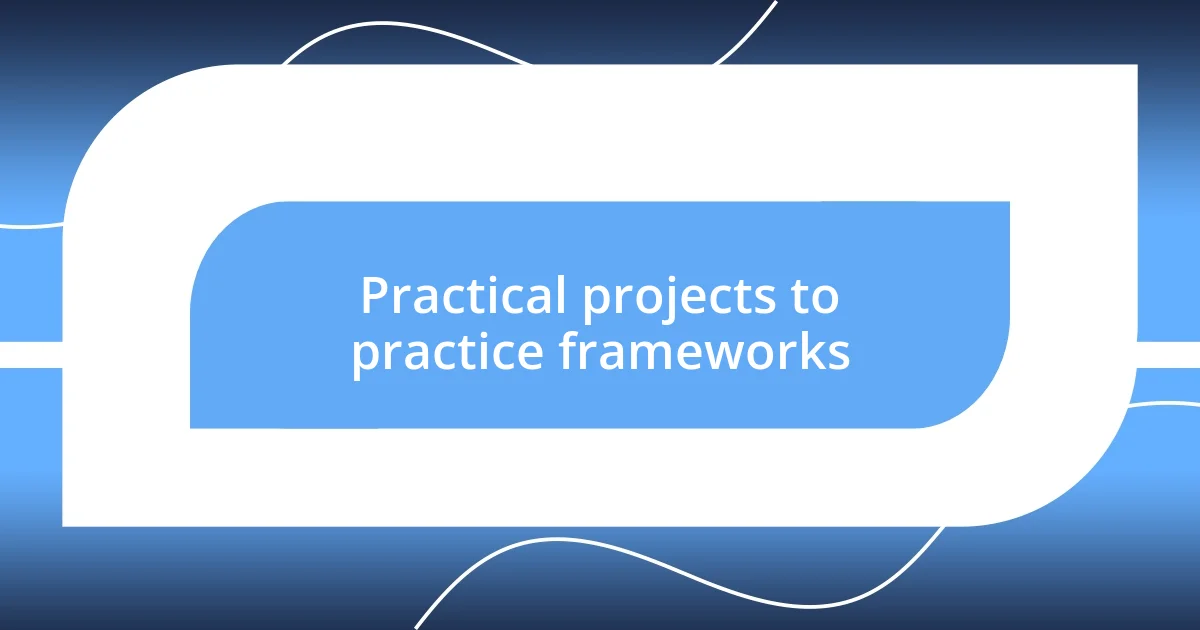
Practical projects to practice frameworks
When it comes to practical projects for honing your skills with JavaScript frameworks, I always find that building a personal portfolio is a fantastic starting point. Not only does this showcase your work, but it also gives you a playground to experiment with different frameworks. For instance, when I built my portfolio using Vue.js, I was amazed at how quickly I could integrate dynamic components, and it felt rewarding to see my previous static site transformed into something interactive. Have you ever felt that rush when a project you envisioned finally comes to life?
Another engaging project I pursued was creating a weather app with React. Initially, it seemed overwhelming to integrate an API for real-time data, but with each hurdle, I learned something valuable. I remember the moment I finally got the data to display correctly; it felt like achieving a mini-milestone. It’s crucial to choose projects that challenge you but are also manageable. By pushing my limits, I built confidence and solidified my understanding of key concepts that made working with React much easier.
Lastly, contributing to open-source projects can be a game-changer. I was once part of a small team that worked on a community-driven app, which provided me with practical experience in a collaborative environment. The feedback I received from more experienced developers was invaluable, helping me recognize areas for improvement that I hadn’t even considered. Isn’t it fascinating how working alongside others can highlight our blind spots and lead to personal growth? Engaging with real-world problems through such projects not only sharpens technical skills but also fosters a sense of community that’s incredibly fulfilling.
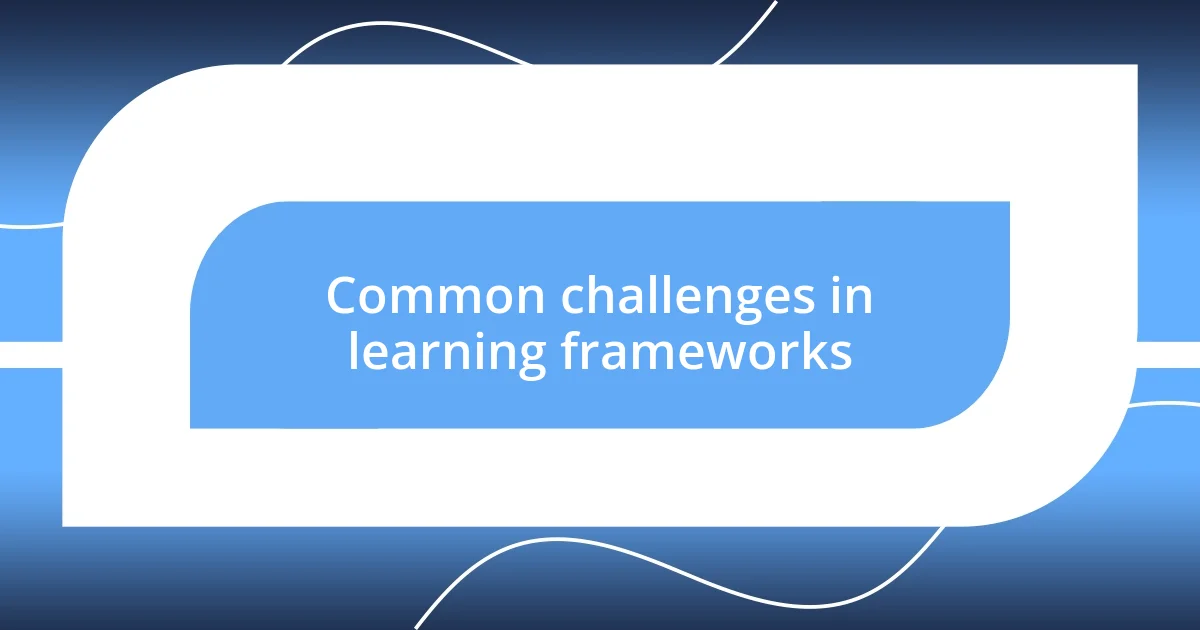
Common challenges in learning frameworks
Learning JavaScript frameworks is exciting, but it’s not without its hurdles. One challenge I faced was the overwhelming amount of information available. I often found myself lost in endless documentation, trying to understand the concepts that seemed deceptively simple at first glance. Have you ever felt that frustration, where one technical term leads to another, leaving you more confused than before? It was during these moments that I realized the importance of focusing on core principles rather than attempting to absorb every piece of information at once.
Another common pitfall is the steep learning curve that accompanies framework requirements. I remember when I initially tackled Angular; the plethora of features and tools made me feel like I was learning a new language. It’s astounding how quickly you can become discouraged when you can’t grasp something right away, isn’t it? The key for me was to break down the complexities into smaller parts and tackle them one at a time, which lightened the cognitive load significantly.
Lastly, integrating frameworks with back-end technologies posed a significant challenge. When I first connected my React app to a Node.js server, I was unaware of how the different parts needed to communicate seamlessly. The debugging process was intense; I recall spending hours trying to diagnose errors that turned out to be minor syntax issues! That experience taught me the value of patience and perseverance in problem-solving. I still carry those lessons forward as I continue to build my skills.
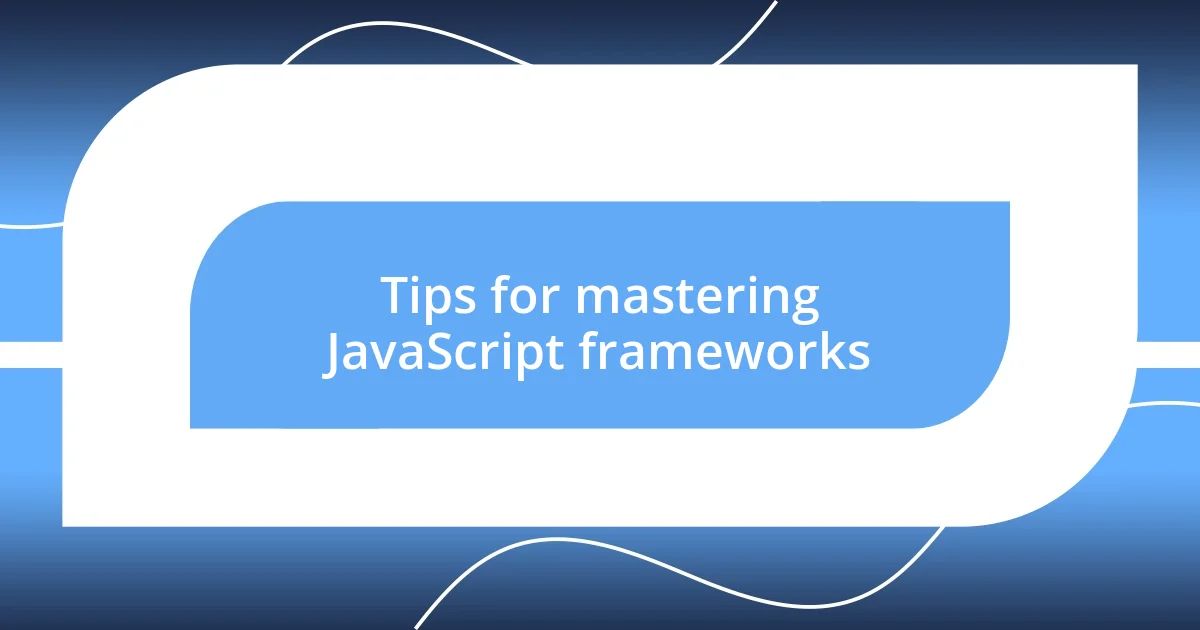
Tips for mastering JavaScript frameworks
When diving into JavaScript frameworks, I found that setting clear, achievable goals was essential. One time, I decided to learn React by committing to build a simple to-do list application over a weekend. This focused task not only kept me motivated, but it also created a tangible endpoint to work towards. Have you ever noticed how having a specific goal can transform the way you approach a learning experience?
Another tip that helped me immensely was joining online communities dedicated to JavaScript frameworks. I remember the first time I participated in a forum discussion about a tricky issue I was facing with Vue.js. The immediate support I received was truly uplifting; it felt like having a team of experts right at my fingertips. Engaging with others not only helped me solve problems faster but also encouraged me to share my own experiences, making the journey feel less isolating. Isn’t it interesting how collaboration can enhance our understanding and boost our confidence?
Lastly, I discovered that regularly revisiting and refactoring my code was a game-changer. After I completed my weather app, I decided to go back and optimize certain parts for performance. As I reviewed what I had written weeks earlier, it often felt like seeing my beginner self in a new light, revealing how much I had grown. That process taught me that learning isn’t a straight line; it’s a cycle of building, reflecting, and improving. Have you considered how revisiting your work can reveal insights about your development journey? It’s those moments of reflection that often lead to the biggest breakthroughs.
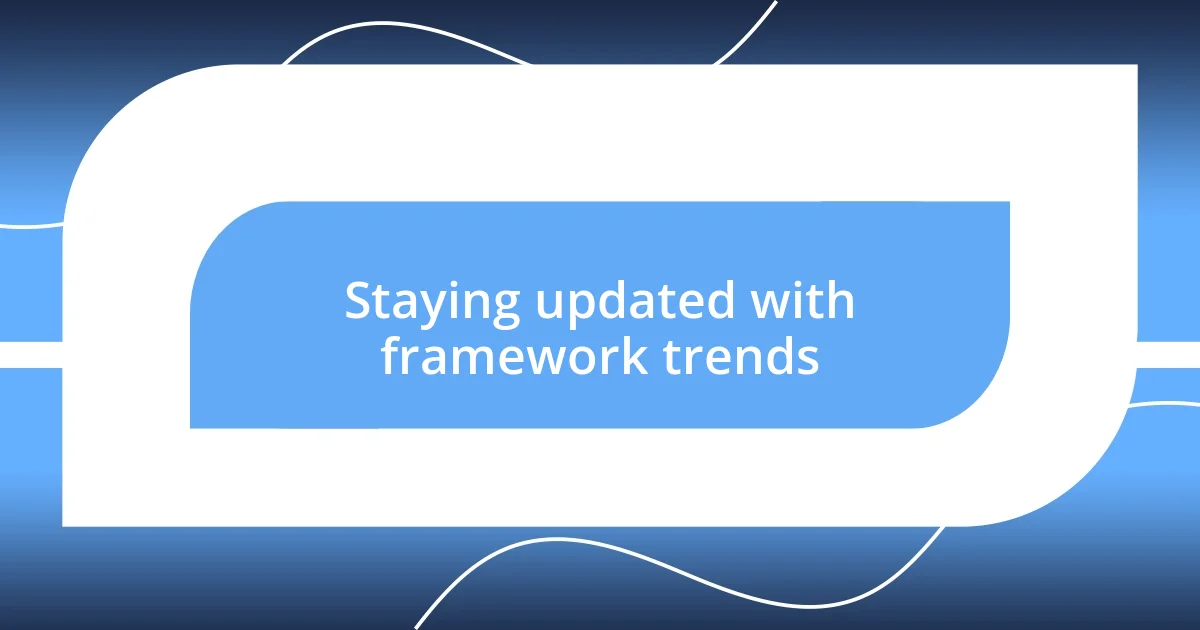
Staying updated with framework trends
Staying updated with JavaScript framework trends is essential in this ever-evolving landscape. I often follow industry leaders and influencers on platforms like Twitter and Medium. Their insights not only keep me informed about new features but also help me understand how those changes might impact my projects. Have you ever wondered how one tweet can spark a creative idea for your next application?
I also make it a point to subscribe to newsletters dedicated to JavaScript frameworks. One particularly enlightening newsletter I found provides weekly updates, tutorials, and community resources. I recall a time when I was struggling to grasp a new feature in React; a detailed article in my inbox explained it in a way that made it click for me. Isn’t it fascinating how the right resource can turn a moment of confusion into clarity?
Moreover, I dedicate time to attend webinars and community meetups. Participating in discussions with fellow developers allows me to hear firsthand accounts of their experiences and tips. I remember leaving one virtual meetup feeling energized after listening to a developer share their journey with Svelte. That exchange of knowledge not only broadened my perspective but also instilled a sense of camaraderie. Have you ever felt that instant connection with someone simply because you both navigate the same challenges? It’s those connections that keep my passion for learning alive.
